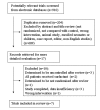Exogenous pulmonary surfactant for acute respiratory distress syndrome in adults: A systematic review and meta-analysis
- PMID: 23251275
- PMCID: PMC3524286
- DOI: 10.3892/etm.2012.746
Exogenous pulmonary surfactant for acute respiratory distress syndrome in adults: A systematic review and meta-analysis
Abstract
Acute respiratory distress syndrome (ARDS) is often characterized by reduced lung compliance, which suggests dysfunction of the endogenous surfactant system. The effectiveness of exogenous surfactants as replacements for the endogenous system in the treatment of ARDS in adults was assessed. Randomized controlled trials from Medline (1950-2011), Embase (1989-2011), the Cochrane Database of Systematic Reviews and the Cochrane Central Register of Controlled Trials (1994-2011) were analyzed. Two reviewers identified trials for inclusion and the results of included trials were quantitatively pooled with a fixed-effects model. Seven trials (2,144 patients) with good methodological quality were included in the analysis. Pulmonary surfactant treatment was not associated with reduced mortality [relative risk (RR), 1.00; 95% confidence interval (CI) 0.89-1.12]. Subgroup analysis revealed no reduced mortality for various surfactant types. Heterogeneity was not significant in the primary outcome analysis (I(2)=0%). There was no evidence of publication bias. Oxygenation, ventilation-free days, duration of ventilation and APACHE II scores did not undergo pooled analysis due to insufficient data. Exogenous surfactant did not reduce mortality in adults with ARDS in our meta-analysis, and we cannot accurately define whether exogenous surfactant has an effect on oxygenation from the included studies.
Figures





Similar articles
-
Effect of surfactant administration on outcomes of adult patients in acute respiratory distress syndrome: a meta-analysis of randomized controlled trials.BMC Pulm Med. 2019 Jan 9;19(1):9. doi: 10.1186/s12890-018-0761-y. BMC Pulm Med. 2019. PMID: 30626363 Free PMC article.
-
Pharmacologic treatments for acute respiratory distress syndrome and acute lung injury: systematic review and meta-analysis.Treat Respir Med. 2004;3(5):307-28. doi: 10.2165/00151829-200403050-00005. Treat Respir Med. 2004. PMID: 15606221
-
Exogenous surfactant may improve oxygenation but not mortality in adult patients with acute lung injury/acute respiratory distress syndrome: a meta-analysis of 9 clinical trials.J Cardiothorac Vasc Anesth. 2012 Oct;26(5):849-56. doi: 10.1053/j.jvca.2011.11.006. Epub 2012 Jan 20. J Cardiothorac Vasc Anesth. 2012. PMID: 22265270 Free PMC article.
-
The efficacy and safety of prone positioning in adults patients with acute respiratory distress syndrome: a meta-analysis of randomized controlled trials.J Thorac Dis. 2015 Mar;7(3):356-67. doi: 10.3978/j.issn.2072-1439.2014.12.49. J Thorac Dis. 2015. PMID: 25922713 Free PMC article.
-
Neuromuscular blocking agents in acute respiratory distress syndrome: updated systematic review and meta-analysis of randomized trials.Intensive Care Med Exp. 2020 Oct 23;8(1):61. doi: 10.1186/s40635-020-00348-6. Intensive Care Med Exp. 2020. PMID: 33095344 Free PMC article. Review.
Cited by
-
Use of exogenous pulmonary surfactant in acute respiratory distress syndrome (ARDS): Role in SARS-CoV-2-related lung injury.Respir Physiol Neurobiol. 2021 Jun;288:103645. doi: 10.1016/j.resp.2021.103645. Epub 2021 Feb 28. Respir Physiol Neurobiol. 2021. PMID: 33657448 Free PMC article. Review.
-
The Role of Pulmonary Surfactants in the Treatment of Acute Respiratory Distress Syndrome in COVID-19.Front Pharmacol. 2021 Jun 29;12:698905. doi: 10.3389/fphar.2021.698905. eCollection 2021. Front Pharmacol. 2021. PMID: 34267664 Free PMC article. Review.
-
Synthetic lung surfactants containing SP-B and SP-C peptides plus novel phospholipase-resistant lipids or glycerophospholipids.PeerJ. 2016 Oct 27;4:e2635. doi: 10.7717/peerj.2635. eCollection 2016. PeerJ. 2016. PMID: 27812430 Free PMC article.
-
Fundamentals of aerosol therapy in critical care.Crit Care. 2016 Oct 7;20(1):269. doi: 10.1186/s13054-016-1448-5. Crit Care. 2016. PMID: 27716346 Free PMC article. Review.
-
Inhalable Vaccines: Can They Help Control Pandemics?Vaccines (Basel). 2022 Aug 13;10(8):1309. doi: 10.3390/vaccines10081309. Vaccines (Basel). 2022. PMID: 36016197 Free PMC article.
References
-
- Ware LB, Matthay MA. The acute respiratory distress syndrome. N Engl J Med. 2000;342:1334–1349. - PubMed
-
- Villar J, Kacmarek RM, Perez-Mendez L, Aquierre-Jaime A. A high positive end-expiratory pressure, low tidal volume ventilatory strategy improves outcome in persistent acute respiratory distress syndrome: a randomized, controlled trial. Crit Care Med. 2000;34:1311–1318. - PubMed
-
- Adhikari N, Burns KE, Meade MO. Pharmacologic treatments for acute respiratory distress syndrome and acute lung injury: systematic review and meta-analysis. Treat Respir Med. 2004;3:307–328. - PubMed
-
- Iwata K, Doi A, Ohji G, et al. Effect of neutrophil elastase inhibitor (sivelestat sodium) in the treatment of acute lung injury (ALI) and acute respiratory distress syndrome (ARDS): a systematic review and meta-analysis. Intern Med. 2010;49:2423–2432. - PubMed
-
- Frerking I, Gunther A, Seeger W, Pison U. Pulmonary surfactant: functions, abnormalities and therapeutic options. Intensive Care Med. 2001;27:1699–1717. - PubMed
LinkOut - more resources
Full Text Sources
